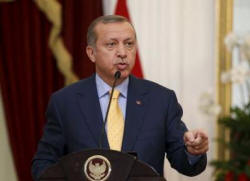|
 Ball
in Erdogan's court as Turkish PM set to give up forming government Ball
in Erdogan's court as Turkish PM set to give up forming government
 Send a link to a friend
Send a link to a friend
[August 18, 2015]
By Orhan Coskun
ANKARA (Reuters) - Turkish Prime Minister
Ahmet Davutoglu was set to formally give up trying to form the next
government on Tuesday after weeks of talks with opposition parties
failed to produce a coalition, a senior ruling party official said.
|
|
 Davutoglu had been trying to find a junior coalition partner since
his AK Party lost its parliamentary majority in an election in June,
leaving it unable to govern alone for the first time since it came
to power in 2002. Davutoglu had been trying to find a junior coalition partner since
his AK Party lost its parliamentary majority in an election in June,
leaving it unable to govern alone for the first time since it came
to power in 2002.
The NATO member has not seen this level of political uncertainty
since the fragile coalition governments of the 1990s: turmoil it
could do without as it takes on a front-line role in the U.S.-led
campaign against Islamic State insurgents in Syria and battles
Kurdish militants at home.
Davutoglu met the leader of the right-wing opposition Nationalist
Movement Party (MHP) on Monday in a last-ditch effort to agree a
working government, but the nationalist leader refused all the
options he presented.
"After yesterday's talks, no coalition option remains for the party.
Davutoglu will therefore return the mandate to the president this
evening," the official told Reuters, asking not to be named because
of the sensitivity of the situation.
Davutoglu was due to meet President Tayyip Erdogan later on Tuesday.

Erdogan could theoretically now hand the mandate to form the next
government to the Republican People's Party (CHP), Turkey's second
biggest party, although it is also highly unlikely to be able to
agree a working coalition before the Aug. 23 deadline.
Under the terms of the constitution, if no government is formed by
Aug. 23, Erdogan must dissolve Davutoglu's caretaker cabinet and
call on an interim power-sharing government to lead Turkey to a new
election in the autumn.
PARALYSIS LOOMS
Such a temporary arrangement would theoretically hand cabinet
positions to four parties with deep ideological divisions, leaving
policy-making paralyzed and deepening the instability that has sent
the lira currency to a series of record lows. <TRYTOM=D3>
But even forming such an interim cabinet is likely to be difficult.
[to top of second column] |

The CHP on Tuesday became the second party to indicate it would not
take part, joining the pro-Kurdish Peoples' Democratic Party (HDP)
in a planned boycott.
"If HDP doesn't offer members to that election government, we will
... not offer members either," CHP deputy group chairman Engin Altay
told Reuters.
The AKP's coalition talks with the main opposition CHP broke down
last week, while the HDP has all along ruled out any coalition with
the ruling party.
Senior AKP officials had been betting that the nationalists,
virulently opposed to greater Kurdish political power, would do
anything possible to avoid a scenario in which the HDP held cabinet
seats, even temporarily.
But nationalist leader Devlet Bahceli appears to be calculating that
the prospect of Kurdish politicians in ministerial positions will so
enrage those on Turkey's political right that they will flock to
support his party at the next election.
Parliament could in theory also vote to allow the current cabinet to
continue working until a new election, but the MHP has already said
it would vote against such a move and other opposition parties have
little incentive to do any different.
(Additional reporting by Gulsen Solaker in Ankara; Writing by Nick
Tattersall; Editing by Daren Butler and Kevin Liffey)
[© 2015 Thomson Reuters. All rights
reserved.]
Copyright 2015 Reuters. All rights reserved. This material may not be published,
broadcast, rewritten or redistributed.
 |